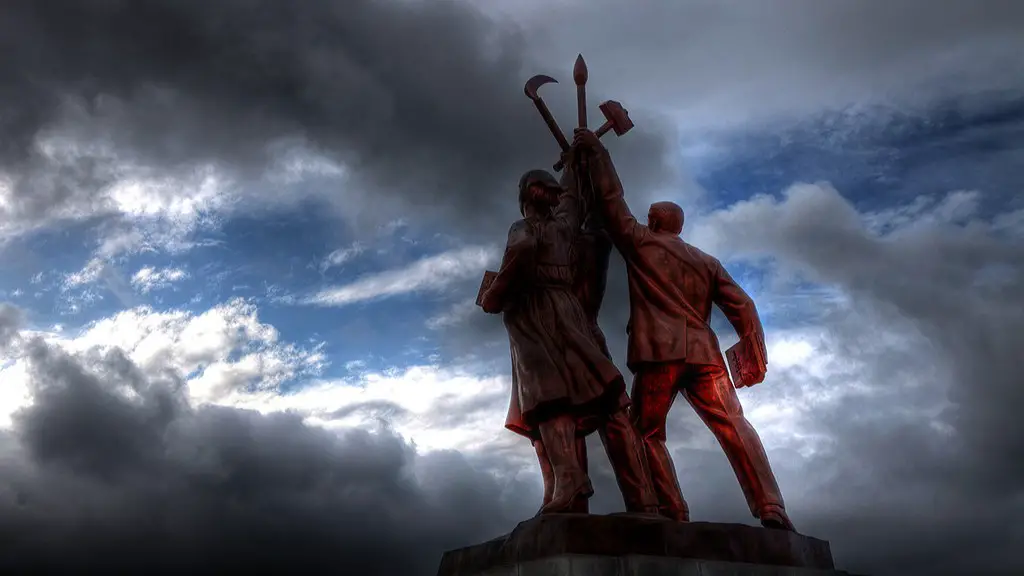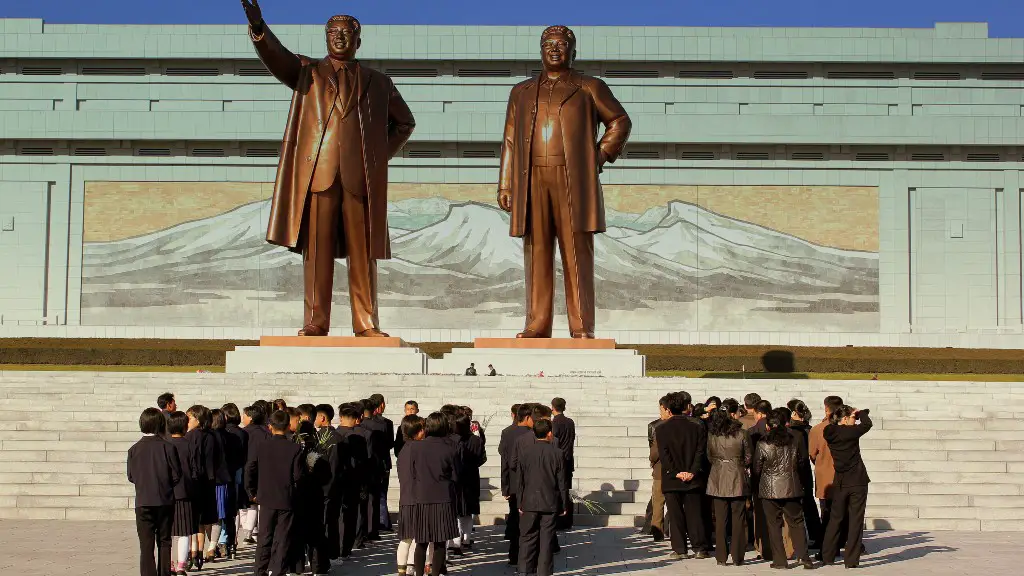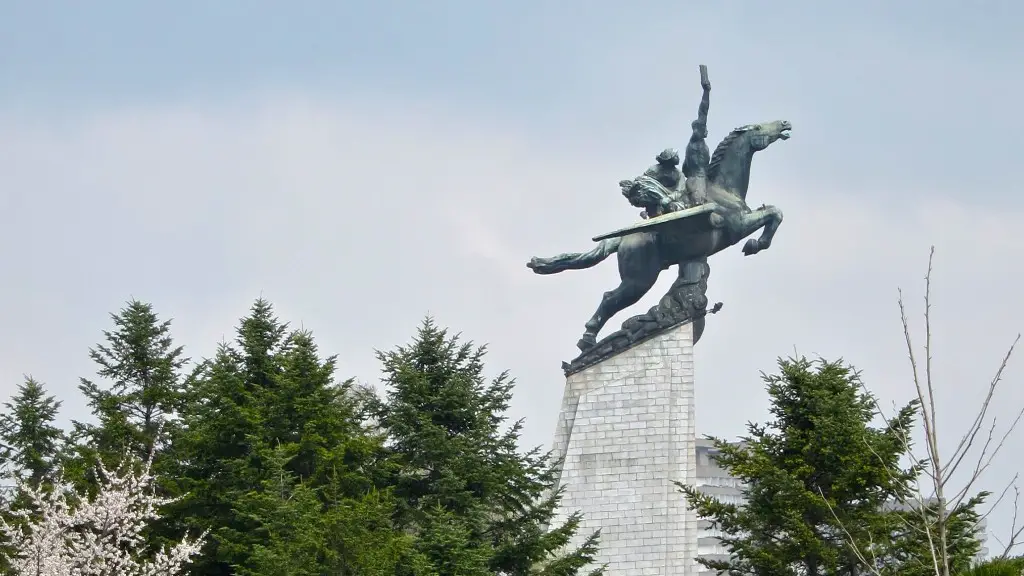North Korea has long been known as one of the most oppressive regimes in the world. This country’s lack of freedom of speech, movement and expression has been heavily criticized by the international community. But why does the North Korean government impose such strict rules?
One of the primary reasons why North Korea enforces strict rules is to maintain control over its population. The government believes that by limiting freedom of speech, press and movement, they can keep the population in line with their ideals. For example, North Korea’s government heavily restricts access to foreign media and websites, along with access to social media, in order to limit the kind of information that its citizens can access. In addition, the country has draconian laws that severely punish those who violate its regulations.
Another reason why North Korea maintains strict rules is the idea that it can protect the country from the threat of foreign influence. The North Korean government is incredibly paranoid about Western ideals and sees the spread of capitalism, liberalism and democracy as a danger to their regime. This means that anyone who is seen as ‘counter-revolutionary’ or critical of the government is punished aggressively. This includes both North Korean citizens and foreign visitors.
Finally, North Korea’s strict rules are also used as a way to maintain tight control over the economy. The North Korean government has imposed rigorous regulations on the economy, including tight restrictions on foreign aid and investments. In addition, the government heavily restricts access to currency and imposes price controls to ensure that the country does not experience rampant inflation.
Clearly, North Korea’s strict rules serve multiple purposes for the regime. While the regime has been harshly criticized by the international community for its lack of freedom and human rights, it is important to understand the underlying motivations behind these rules in order to better comprehend the challenges the country faces and how it can potentially progress in the future.
Censorship in North Korea
One of the primary ways in which North Korea enforces its strict rules is through censorship. The country heavily restricts access to foreign media and websites, as well as social media, in order to limit the kind of information that its citizens can access. This includes books, films, music, and anything else that the government deems to be subversive or critical of its regime. This severe censorship has allowed the North Korean regime to control the narrative and distort the facts in order to maintain their power.
In addition to the formal censorship imposed by the government, North Koreans self-censor in fear of punishment or retribution. This means that they often avoid talking openly about politics and openly challenging the government, thus limiting their ability to engage freely with the outside world. This has created a culture of fear and suspicion that is only compounded by the regime’s use of surveillance.
Finally, there is also a level of censorship outside of North Korea as well. Due to issues such as politics, trade, and sanctions, the international community is unable to access certain information about the country and its inner workings. This has allowed the regime to maintain its grip on the population and prevent outsiders from gaining a better understanding of its politics and policies.
The Impact of Strict Rules
The North Korean government’s strict rules have had a profound impact on its citizens. For starters, the lack of freedom of speech and expression has curtailed any kind of dissent or critical thought. This has created a society where citizens are more likely to remain obedient to the government and less likely to engage in any kind of opposition.
The North Korean government’s strict regulations have also had a severe economic impact on the country. The heavy restrictions on foreign aid and investments, as well as the tight control of currency, has limited the amount of money available to fund development projects and alleviate poverty. This has had a damaging effect on the country’s already weak economy, as well as its ability to provide for its citizens.
In addition, the North Korean government’s restrictive policies have also had a detrimental effect on the international community. The country’s lack of engagement with the outside world has only exacerbated the regime’s oppressive nature and has irked the international community, leading to increased sanctions and a further widening of the gap between North Korea and the rest of the world.
Civil Rights Violations
One of the most concerning aspects of North Korea’s regime is the country’s flagrant disregard for civil and human rights. The country has implemented harsh laws that severely punish those who speak out against the government or act contrary to its ideologies. This includes harsh prison sentences, torture and even execution. In addition, the North Korean government is also well known for its human rights abuses, such as forced labor, arbitrary arrests and abuses in the prison system.
The North Korean government’s egregious human rights violations have been widely denounced by the international community and have prompted several sanctions against the regime. However, these sanctions have only had limited effectiveness, as the regime continues to ignore the charges against them and carry out their oppressive policies.
In addition to the harsh punishments faced by those who disobey the ruling party, North Korea also enforces strict gender roles. Women are expected to adhere to traditional norms and are often barred from high-level positions in business and politics. This has had a detrimental effect on the country’s development, as the lack of female representation in these areas has prevented the country from making progress on economic and social issues.
International Pressure
In recent years, the international community has become increasingly vocal in its criticism of North Korea’s human rights abuses. Several countries, including the United States, have imposed sanctions on the country in an attempt to pressure the regime into changing its policies. However, these sanctions have had limited success and have largely failed to bring about any meaningful change.
In addition to sanctions, several countries have also voiced their support for the civil society and pro-democracy activists within North Korea. Various nongovernmental organizations have also been set up in an effort to support those fighting for freedom and democracy within the country. This type of support is essential if the North Korean oppressive regime is to be brought to an end.
However, it is important to remember that the North Korean government may not be willing to bend to international pressure. The regime is deeply entrenched in its ideology and views any criticism of its policies as a threat to its power. Thus, it is unlikely that international pressure alone will be able to bring about change.
Domestic Pressure
Although international pressure has had limited success in changing North Korea’s policies, it has resulted in an increase in domestic opposition to the regime. In recent years, there has been a growing civil society movement within North Korea aimed at challenging the ruling party and advocating for greater freedom and democracy. Despite the immense risks involved, these brave individuals have shown great courage in their struggle for change.
In addition to the traditional forms of protest, such as rallies and demonstrations, there has also been a rise in online activism. There have been several cases of people using the internet to spread news and information about the regime and its human rights violations. This has been incredibly effective, as it has given people within the country access to otherwise censored information.
Although this domestic pressure has had some success in bringing attention to the plight of the North Korean people, it is unlikely to be enough to bring about systemic change. The regime is well aware of the power of these movements and has sought to suppress them at any cost. Thus, any meaningful change will most likely require a combination of domestic and international pressure.
Recommendations
In order to effectively address the challenging situation in North Korea, it is necessary to understand the motivations behind the regime’s oppressive policies. International pressure is necessary to raise awareness of the situation, but it is also important to recognize the limits of what can be achieved in the short term. Thus, a more effective long-term approach is needed.
The key to making progress in North Korea lies in opening up the country to the outside world and encouraging engagement with its population. This should include providing economic and social aid to citizens and bolstering the brave voices within the country who are fighting for change. In addition, the international community should continue to raise awareness and pressure the regime through sanctions and other measures.
Finally, it is also important to note that any changes that do happen in North Korea will certainly not be quick or easy. The regime is unlikely to give up its power without a fight and the road to freedom and democracy will likely be long and difficult. However, with the support of the international community, anything is possible.





